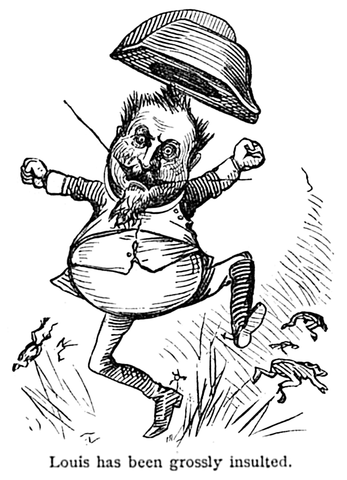本日は脱線の回です。今回のフランスでのテロ事件と、アフリカ・イスラム圏の旧フランス植民地の事情が関係あるのかわかりませんが、旧フランス植民地は不安定で争いが多い、といわれます。この点につき、ここまで植民地のビジネスモデルについて書いてきた中で、私なりにいろいろ考えます。簡単に言うと、フランスの植民地は、「ビジネスモデルがなかった」、あるいは何かあったとしてもきちんとエクセキュートできず、このため植民地の住民と共存共栄の関係を築くことができなかったのでは、と考えています。 (26)で書いたように、フランスの植民地は前期と後期に分けることができます。「前期」はアメリカ大陸でしたが、カナダをイギリスに取られ、ナポレオンがルイジアナをやけくそでアメリカ合衆国に売却して、いったん全部なくなってしまいます。古い時代の植民地ビジネスモデルの典型は、オランダ型の「アービトラージ貿易の拠点」であり、より新しいモデルとしてイギリス型の「土地投機」がアメリカで行われましたが、フランスはどちらのモデルも作れず、植民地からの収入よりもメンテナンス・コストのほうが高くなって、植民地を維持できなくなったのでしたね。
さて、そのフランスが再度植民地競争シーンに登場するのは、19世紀半ば頃のナポレオン3世の時代です。この人は19世紀最大の奇人ともいえる超変な人で、別の記事でもう少し詳しく書きたいと思いますが、なにしろ「フランスの栄光を再び」ということで、当時先行していたライバルのイギリスに負けないよう、突如として植民地獲得に乗り出しました。イギリスがまだがっちり確保していなかったところ、つまりは「二級立地」に進出するという「モスバーガー戦略」でありましたが、「選択と集中」を全然せず、アフリカと中近東とインドシナと南太平洋と、などと手当たり次第に戦線を拡大していき、最後はメキシコで致命的なミスを冒して、彼自身の転落につながっていきます。
ナポレオン3世の手当たり次第なやり方は、ちゃんとした「ビジネスモデル」があってやっていたのではなく、イギリスとの競争に煽られ、「国家威信」にドライブされていたように見えます。
イギリスの場合は「土地投機」ですから、入手した土地が価値を生み出すようにしないといけません。現代の土地デベロッパーが、工場を誘致したりショッピングモールを建てたり、アクセスのための道路や鉄道を作るのと同じです。そこで、植民地にプランテーションをつくり、インドやアメリカで綿花を作ってイギリスに持ってきて製品にして売るという仕組みをつくり、そのための輸送や通信のインフラを整備し、人も大量に送り込んでいます。良かったのか悪かったのかの価値評価は置くとして、兎にも角にも植民地に資金と人が投下され、インフラで恩恵を蒙る「味方」も現地にそれなりにたくさん存在しました。
しかし、19世紀後半の短期間に急激に薄く広がったフランスの植民地では、イギリスほどの投資やインフラ整備が行われた様子はありません。「前期植民地」のカナダ・アメリカでも、フランスの「インフラ投資不足」が直接命取りになったのですが、非白人住民の多い「後期植民地」では、現地住民の民族分布を完全に無視した行政区分を敷き、住民の土地所有を認めず、現地住民を低い立場において、搾取する構造を作りました。土地に投資して上がりを得るビジネスでなく、「国家威信」が主な目的であったように見える所以です。
ナポレオン3世がこれほど急激に植民地を拡大できたのは、他のヨーロッパ強国が、ナポレオン戦争後にフランスを封じ込めるための「ウィーン体制」という複雑なパワーバランスをヨーロッパ域内で維持することを重視し、その代わりフランスがヨーロッパの外でジャイアン化して暴れるのには目をつぶっていたという事情もあります。
そして、ナポレオン3世を選挙で選んだ(彼は最初大統領に当選し、その後皇帝になった)フランス国民は、ナポレオン時代の「大きな領土を持つ栄光あるフランス」を良きものとみなし、そのフランスの領土を再び拡大するナポレオン3世のやり方を支持していました。19世紀ヨーロッパ歴史講義で、講師のロバート・ワイナー教授は「現代でも、フランス国民は一般に広い植民地を持っていたことを誇りと考える傾向が強く、評価の低かったナポレオン3世が再評価される中でも、特に植民地の拡大が彼の功績として見直されている」と述べています。
なお、日本にフランスが最初にやってきたのも、まさにナポレオン3世の時代、日本の幕末でした。それまで江戸時代中期から後期にかけて、日本の沿岸に出没していたのは、おもにオロシャ(=ロシア)とエゲレス(=イギリス)だったのに、この頃突然フランスがやってきて、徳川幕府に取り行ったのは、奇人ナポレオン3世のジャイアン政策のせいです。彼は、当時最大のライバルであったイギリスに対して、植民地では融和的な行動をとることが多かったのですが、日本では例外的に、フランスは幕府、イギリスは薩長と別れて戦いました。結果はみなさまご存知のとおりです。
19世紀後半以降の帝国主義時代、日本から見ると「欧米列強」は、どいつもこいつも同じように、領土拡大にひた走っていたように見えますが、拡大した領土にどれだけ投資して何を作ってどう儲けるか、という戦略において、やはりイギリスがずば抜けて上手かったと言えそうです。スペインは当時すでに脱落気味、ロシア・ドイツ・イタリアはあまりにも参入が遅くて間に合わず、そしてフランスは表面だけイギリスの真似をして領土を拡大したところで終わってしまった、と言えそうです。
出典:Wikipedia, Long 19th Century: European History from 1789 to 1917



